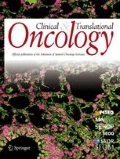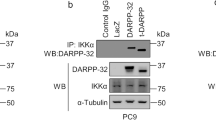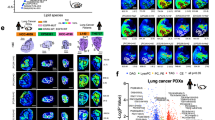Abstract
Purpose
Lung cancer is a leading cause of cancer deaths and efforts are underway to identify novel therapies to treat these tumors. Diacylglycerol kinase η (DGKη), an enzyme that phosphorylates diacylglycerol to form phosphatidic acid, has been shown to modulate MAPK signaling downstream of EGFR, which is an oncogenic driver in some lung cancers. Since mutations in EGFR and K-Ras are common in lung cancer, we hypothesized that limiting the function of DGKη would attenuate oncogenic properties of lung cancer cells.
Methods
We determined the expression levels of DGKη in a mouse models of mutant EGFR and K-Ras lung cancer and in human lung cancer cell lines with activating mutations in either EGFR or K-Ras. We also tested the effects of shRNA-mediated depletion of DGKη in lung cancer cells and tested if DGKη depletion augmented the effects of afatinib, a new generation EGFR inhibitor.
Results
DGKη was expressed in malignant epithelium from mice with mutant EGFR or K-Ras lung cancer. It was also expressed in human lung cancer cell lines with EGFR or K-Ras mutations. Depleting DGKη in lung cancer cell lines, harboring mutant EGFR, reduced their growth on plastic and in soft agar and also augmented the effects of afatinib, an EGFR inhibitor. DGKη depletion also reduced growth of one of two lung cancer cell lines that harbored mutant K-Ras.
Conclusions
Our data indicate that DGKη is a potential therapeutic target in lung cancers, especially those harboring EGFR mutations. Our findings warrant further studies to examine the effects of limiting its function in vivo.





Similar content being viewed by others
Abbreviations
- EGFR:
-
Epidermal growth factor receptor
- DGK:
-
Diacylglycerol kinase
- DMEM:
-
Dulbecco’s modified Eagle’s medium
- rtTA:
-
Reverse tetracycline-controlled transactivator
- CCSP:
-
Clara cell secretory protein
- PCNA:
-
Proliferating cell nuclear antigen
- NSCLC:
-
Non-small cell lung cancer
References
Sun S, Schiller JH, Gazdar AF. Lung cancer in never smokers—a different disease. Nat Rev Cancer. 2007;7:778–90.
Pao W, Chmielecki J. Rational, biologically based treatment of EGFR-mutant non-small-cell lung cancer. Nat Rev Cancer. 2010;10:760–74.
Maemondo M, Inoue A, Kobayashi K, Sugawara S, Oizumi S, Isobe H, et al. Gefitinib or chemotherapy for non-small-cell lung cancer with mutated EGFR. New Engl J Med. 2010;362:2380–8.
Mitsudomi T, Morita S, Yatabe Y, Negoro S, Okamoto I, Tsurutani J, et al. Gefitinib versus cisplatin plus docetaxel in patients with non-small-cell lung cancer harbouring mutations of the epidermal growth factor receptor (WJTOG3405): an open label, randomised phase 3 trial. Lancet Oncol. 2010;11:121–8.
Mok TS, Wu YL, Thongprasert S, Yang CH, Chu DT, Saijo N, et al. Gefitinib or carboplatin-paclitaxel in pulmonary adenocarcinoma. New Engl J Med. 2009;361:947–57.
Rosell R, Carcereny E, Gervais R, Vergnenegre A, Massuti B, Felip E, et al. Erlotinib versus standard chemotherapy as first-line treatment for European patients with advanced EGFR mutation-positive non-small-cell lung cancer (EURTAC): a multicentre, open-label, randomised phase 3 trial. Lancet Oncol. 2012;13:239–46.
Zhou C, Wu YL, Chen G, Feng J, Liu XQ, Wang C, et al. Erlotinib versus chemotherapy as first-line treatment for patients with advanced EGFR mutation-positive non-small-cell lung cancer (OPTIMAL, CTONG-0802): a multicentre, open-label, randomised, phase 3 study. Lancet Oncol. 2011;12:735–42.
Engelman JA, Zejnullahu K, Mitsudomi T, Song Y, Hyland C, Park JO, et al. MET amplification leads to gefitinib resistance in lung cancer by activating ERBB3 signaling. Science. 2007;316:1039–43.
Kobayashi S, Boggon TJ, Dayaram T, Janne PA, Kocher O, Meyerson M, et al. EGFR mutation and resistance of non-small-cell lung cancer to gefitinib. New Engl J Med. 2005;352:786–92.
Pao W, Miller VA, Politi KA, Riely GJ, Somwar R, Zakowski MF, et al. Acquired resistance of lung adenocarcinomas to gefitinib or erlotinib is associated with a second mutation in the EGFR kinase domain. PLoS Med. 2005;2:e73.
Cai J, Crotty TM, Reichert E, Carraway KL, Stafforini DM, Topham MK. Diacylglycerol kinase delta and protein kinase C(alpha) modulate epidermal growth factor receptor abundance and degradation through ubiquitin-specific protease 8. J Biol Chem. 2010;285:6952–9.
Yasuda S, Kai M, Imai S, Takeishi K, Taketomi A, Toyota M, et al. Diacylglycerol kinase eta augments C-Raf activity and B-Raf/C-Raf heterodimerization. J Biol Chem. 2009;284:29559–70.
Al-Salihi MA, Ulmer SC, Doan T, Nelson CD, Crotty T, Prescott SM, et al. Cyclooxygenase-2 transactivates the epidermal growth factor receptor through specific E-prostanoid receptors and tumor necrosis factor-alpha converting enzyme. Cell Signal. 2007;19:1956–63.
Ding L, Traer E, McIntyre TM, Zimmerman GA, Prescott SM. The cloning and characterization of a novel human diacylglycerol kinase DGKι. J Biol Chem. 1998;273:32746–52.
Oliver TG, Mercer KL, Sayles LC, Burke JR, Mendus D, Lovejoy KS, et al. Chronic cisplatin treatment promotes enhanced damage repair and tumor progression in a mouse model of lung cancer. Genes Dev. 2010;24:837–52.
Murakami T, Sakani F, Imai S, Houkin K, Kanoh H. Identification and characterization of two splice variants of diacylglycerol kinase η. J Biol Chem. 2003;278:34364–72.
Politi K, Zakowski MF, Fan P, Schonfeld EA, Pao W, Varmus HE. Lung adenocarcinomas induced in mice by mutant EGF receptors found in human lung cancers respond to a tyrosine kinase inhibitor or to down-regulation of the receptors. Genes Dev. 2006;20:1496–510.
Yang JC, Shih JY, Su WC, Hsia TC, Tsai CM, Ou SH, et al. Afatinib for patients with lung adenocarcinoma and epidermal growth factor receptor mutations (LUX-Lung 2): a phase 2 trial. Lancet Oncol. 2012;13:539–48.
Ciardiello F, Tortora G. EGFR antagonists in cancer treatment. New Engl J Med. 2008;358:1160–74.
Hou J, Aerts J, den Hamer B, van Ijcken W, den Bakker M, Riegman P, et al. Gene expression-based classification of non-small cell lung carcinomas and survival prediction. PLoS ONE. 2010;5:e10312.
Crotty T, Cai J, Sakane F, Taketomi A, Prescott SM, Topham MK. Diacylglycerol kinase delta regulates protein kinase C and epidermal growth factor receptor signaling. Proc Natl Acad Sci USA. 2006;103:15485–90.
Shulga YV, Topham MK, Epand RM. Regulation and functions of diacylglycerol kinases. Chem Rev. 2011;111:6186–208.
Acknowledgments
This work was supported by the Huntsman Cancer Foundation, the R. Harold Burton Foundation, the National Institutes of Health Grants R01-CA95463 (to M.K.T.) and by P30-CA042014.
Conflict of interest
The authors declare no conflicts of interest.
Author information
Authors and Affiliations
Corresponding author
Additional information
T. Nakano and A. Iravani contributed equally to this manuscript.
Rights and permissions
About this article
Cite this article
Nakano, T., Iravani, A., Kim, M. et al. Diacylglycerol kinase η modulates oncogenic properties of lung cancer cells. Clin Transl Oncol 16, 29–35 (2014). https://doi.org/10.1007/s12094-013-1036-y
Received:
Accepted:
Published:
Issue Date:
DOI: https://doi.org/10.1007/s12094-013-1036-y




